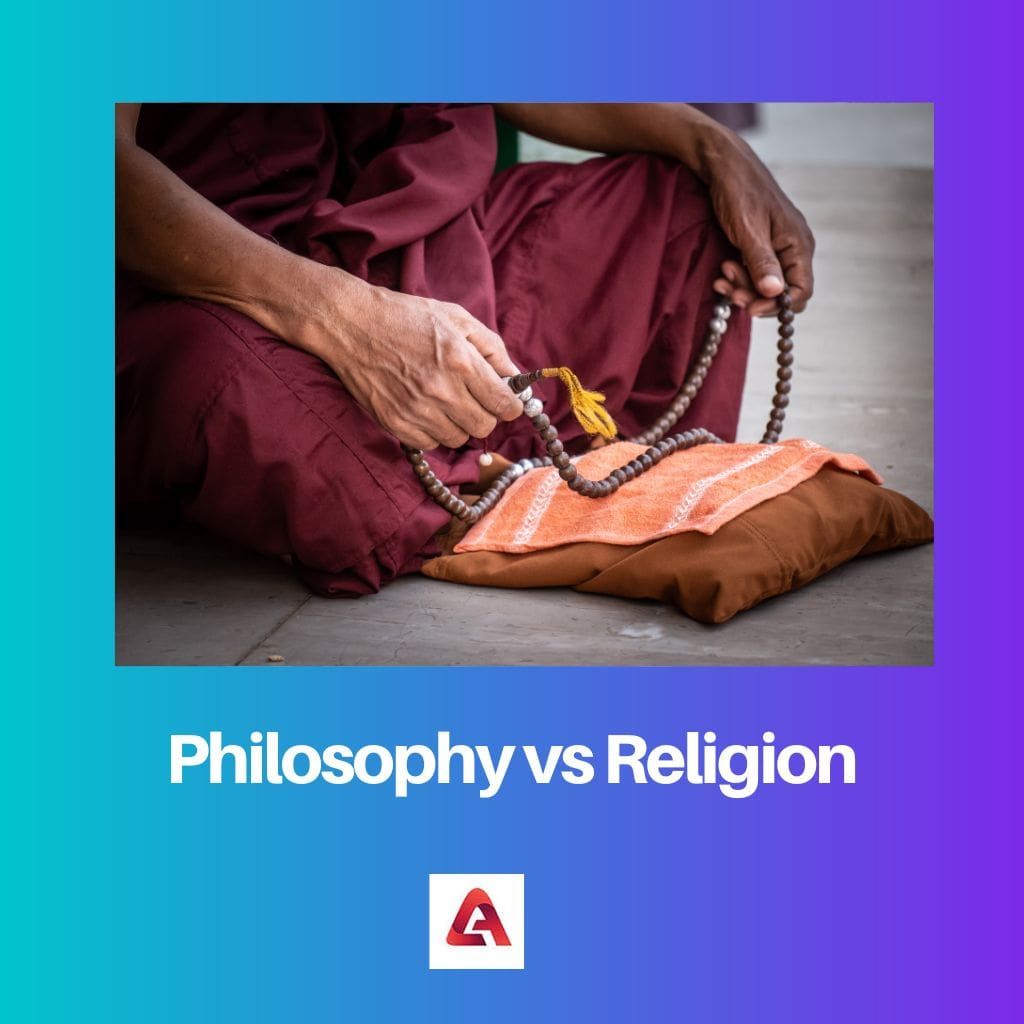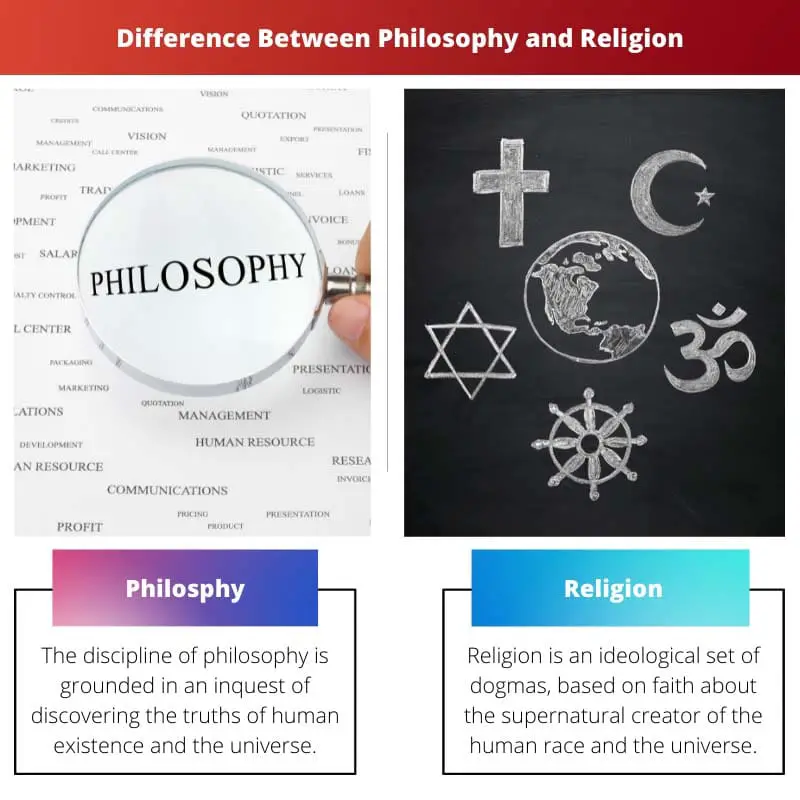Philosophy explores fundamental questions about existence, knowledge, and ethics through rational inquiry and critical analysis, aiming for reasoned conclusions independent of divine revelation. Religion, on the other hand, relies on faith, rituals, and sacred texts to address similar questions, emphasizing belief in supernatural entities or divine guidance as sources of ultimate truth and meaning.
Key Takeaways
- Philosophy is a rational inquiry into the nature of reality, existence, knowledge, and ethics.
- Religion involves a set of beliefs, practices, and rituals related to divine or supernatural power.
- Philosophy is based on reason and critical thinking, while religion is based on faith and spirituality.
Philosophy vs Religion
Philosophy is concerned with questions related to the nature of reality, knowledge, logic, and the meaning of life. Religion concerns questions about the supernatural, faith, spirituality, and moral values. It seeks to answer fundamental questions about human existence through belief in the divine.

Comparison Table
| Feature | Philosophy | Religion |
|---|---|---|
| Primary Aim | Pursue wisdom and understanding of fundamental questions through reason and critical thinking. | Provide a moral and ethical framework for living and a connection to the transcendent (e.g., God, gods, or ultimate reality) through faith and/or practice. |
| Basis of Knowledge | Reason, logic, and evidence (including arguments from observation, experience, and other philosophers). | Faith, scripture, tradition, and/or personal experience (considered divine revelation or sacred). |
| Questions Addressed | Fundamental questions about existence, knowledge, morality, reality, meaning, and the human condition. | Questions about the purpose of life, the nature of the afterlife, the existence of the divine, and the proper way to live. |
| Approach to Truth | Open-ended and continuously evolving through questioning and debate. | Often presented as absolute and revealed by a higher power or contained in scripture. |
| Structure | Diverse schools of thought, with no single authority figure or central organization. | Often organized into established traditions with leaders or communities that interpret and transmit beliefs and practices. |
| Practices | May involve reflection, meditation, critical thinking, and dialogue. | May involve prayer, worship, rituals, and adherence to specific moral codes. |
What is Philosophy?
Philosophy is a multifaceted discipline that encompasses inquiry into fundamental questions about existence, knowledge, ethics, and the nature of reality. It seeks to understand the world and our place within it through rigorous analysis, critical thinking, and logical reasoning.
Origins and Development
Philosophy has its roots in ancient civilizations, with prominent figures such as Socrates, Plato, and Aristotle shaping its early foundations in Greece. It evolved over centuries, spreading across cultures and continents, with diverse schools of thought emerging, including metaphysics, epistemology, ethics, logic, and aesthetics.
Key Areas of Inquiry
- Metaphysics: Metaphysics examines the nature of reality, exploring questions about existence, substance, space, time, causality, and the relationship between mind and matter. It delves into abstract concepts such as being, identity, and the ultimate nature of existence.
- Epistemology: Epistemology investigates the nature, scope, and limits of human knowledge. It explores questions concerning the sources of knowledge, the criteria for truth and justification, skepticism, and the nature of belief and certainty.
- Ethics: Ethics deals with questions of morality, values, and right conduct. It examines concepts such as good and evil, justice, virtue, and the foundations of ethical theories, including utilitarianism, deontology, and virtue ethics.
- Logic: Logic is concerned with the principles of valid reasoning and inference. It studies the structure of arguments, logical fallacies, deductive and inductive reasoning, and the principles of formal logic, which underpin rational discourse and critical thinking.
Methodology and Approaches
Philosophical inquiry employs a variety of methodologies, including conceptual analysis, thought experiments, thought experiments, and dialectical reasoning. It involves engaging with foundational texts, engaging in debate, and critically evaluating arguments to arrive at reasoned conclusions.

What is Religion?
Religion is a complex cultural phenomenon characterized by beliefs, practices, rituals, and moral codes that address fundamental questions about the nature of existence, the divine, morality, and the purpose of life. It encompasses diverse traditions, doctrines, and spiritual practices that shape individuals’ worldviews and guide their behavior within communities.
Origins and Development
Religion has been a central aspect of human culture since ancient times, emerging independently across different societies and civilizations. Its origins lie in humanity’s attempts to make sense of the mysteries of existence, including the origin of the universe, the nature of life and death, and humanity’s relationship with the divine or supernatural realms.
Key Elements
- Beliefs: Religion involves adherence to a set of beliefs concerning the nature of the divine, the afterlife, moral principles, and the origins of the universe and humanity. These beliefs provide a framework for understanding the world and one’s place within it.
- Practices and Rituals: Religious practices and rituals encompass a wide range of activities, including prayer, meditation, worship, sacraments, ceremonies, and pilgrimage. These rituals serve to express devotion, cultivate spiritual connections, and reinforce communal bonds among believers.
- Sacred Texts and Traditions: Many religions have sacred texts, scriptures, or oral traditions that convey teachings, myths, and moral guidance. These texts serve as authoritative sources of religious doctrine and provide a basis for interpreting and understanding divine will.
- Community and Institutions: Religion fosters communal identity and social cohesion through shared beliefs, values, and practices. Religious communities may organize around formal institutions such as churches, mosques, temples, or synagogues, providing spaces for worship, education, and social support.
Functions and Significance
- Meaning and Purpose: Religion offers explanations for life’s existential questions and provides a sense of meaning, purpose, and transcendence.
- Morality and Ethics: Religious teachings provide moral guidelines and ethical principles that shape individuals’ behavior and contribute to social cohesion and harmony.
- Identity and Community: Religion plays a central role in shaping personal identity and fostering a sense of belonging within religious communities, which offer support networks and opportunities for collective worship and fellowship.
- Cultural and Social Influence: Religion influences cultural practices, art, architecture, literature, and social norms, contributing to the rich tapestry of human diversity and shaping societal values and institutions.
Diversity and Plurality
Religion exhibits remarkable diversity, encompassing a vast array of beliefs, practices, and traditions across different cultures, historical periods, and geographical regions. This diversity reflects the complexity of human spirituality and the myriad ways in which people seek meaning, connection, and transcendence in their lives.

Main Differences Between Philosophy and Religion
- Epistemological Approach:
- Philosophy relies on reason, critical thinking, and empirical evidence to investigate fundamental questions about existence, knowledge, and ethics.
- Religion emphasizes faith, revelation, and sacred texts as sources of ultimate truth, accepting beliefs on the basis of divine authority rather than empirical verification.
- Nature of Inquiry:
- Philosophy engages in systematic inquiry and conceptual analysis, seeking to understand the nature of reality, human existence, and moral principles through rational discourse.
- Religion focuses on spiritual and metaphysical truths, addressing existential questions about the divine, the afterlife, and morality within the framework of faith, myth, and tradition.
- Methodology and Criteria for Truth:
- Philosophy employs methodologies such as logic, argumentation, and philosophical reasoning to evaluate hypotheses and arrive at reasoned conclusions.
- Religion relies on sacred texts, religious experiences, and divine revelation as authoritative sources of truth, with beliefs and doctrines accepted based on their alignment with religious teachings rather than logical consistency or empirical evidence.
- Scope of Inquiry:
- Philosophy encompasses a broad range of disciplines, including metaphysics, epistemology, ethics, and logic, and engages with questions about the nature of reality, knowledge, morality, and rationality.
- Religion focuses primarily on matters of spirituality, morality, and divine worship, addressing questions related to the existence of God, the meaning of life, and the nature of the soul, within the context of specific religious traditions and doctrines.

- http://search.proquest.com/openview/377034e4dac3092a02e1bb2dbe6152dc/1?pq-origsite=gscholar&cbl=39453
- https://books.google.com/books?hl=en&lr=&id=Z8DytgeDVQAC&oi=fnd&pg=PA211&dq=philosophy+and+religion+differences&ots=l6HIihXzod&sig=1taHkCyjZJFSssqBNII0T1jgKx8